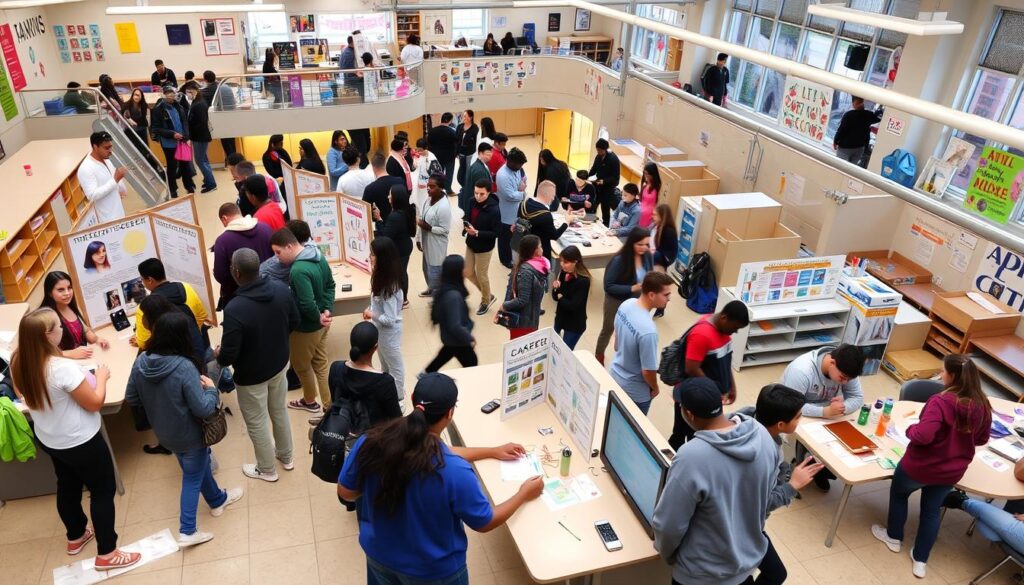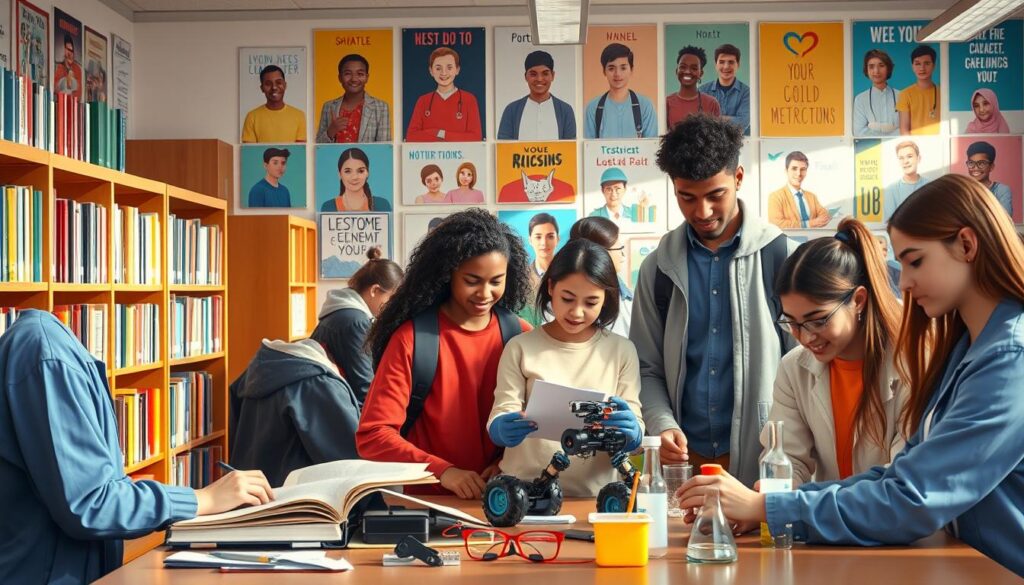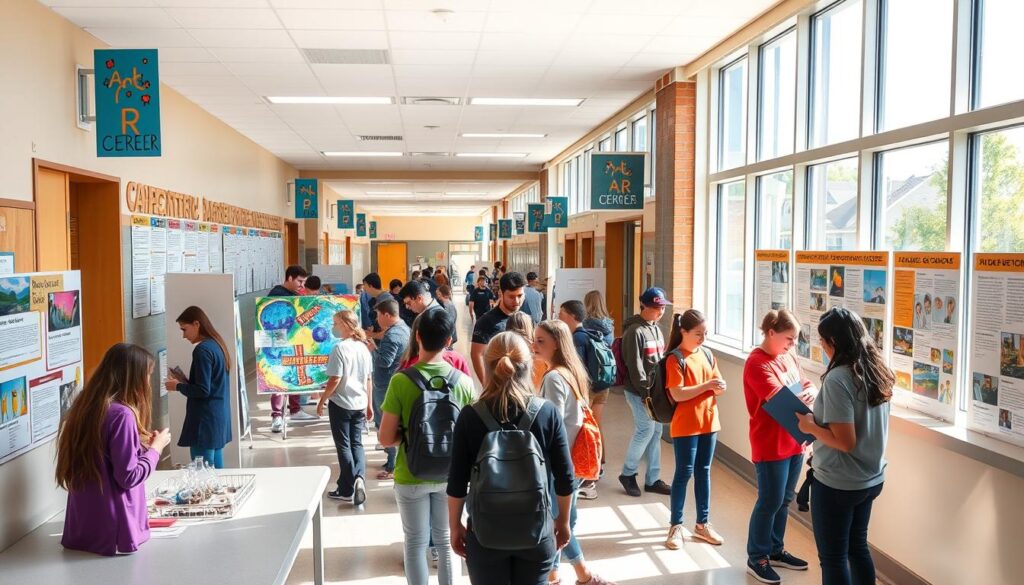Did you know only 30% of high school students feel ready to choose their careers? This fact shows how crucial career development for high school students. I’m here to help you plan your career and give you the tools you need. This guide will cover everything from setting goals to finding your career path through education.
By the end of this guide, you’ll know why career development is key for teens. You’ll also learn how to use resources to get ready for your career.
Key Takeaways
- Understanding the eight-step guide for career planning can enhance your decision-making.
- The OxBright Career Test can provide personalized career recommendations tailored to your skills and interests.
- Transferable skills are valuable across various careers and should be a focus in your development.
- Researching education pathways, universities, and potential salaries aids in making informed decisions.
- Engaging in internships and volunteer opportunities is crucial for gaining relevant experience before university.
- SMART goals—Specific, Measurable, Achievable, Relevant, Time-Bound—can guide your career planning effectively.
Understanding Career Development
Career development is a lifelong journey of growth, especially in high school. At this time, students start making choices that will guide their future careers. Investigating career options in high school is essential for determining your interests and strengths.
Seeing yourself as a recruiter can help. You can look at your skills and what you like to find the right career. Getting help from mentors is also key. They can guide you through resume building, mock interviews, and exploring career options.
Technical skills are very important. A 2005 survey showed that most manufacturers value them highly. Youth apprenticeships offer on-the-job training, which can lead to good jobs and learning by doing.
These programs can even help you earn college credits or degrees. Completing a registered apprenticeship program gets you a national certification. Career exploration also means looking at trends, like Gen Z’s interest in entertainment and technology.

Having access to information is key for career growth. The U.S. Bureau of Labor Statistics has lots of data on jobs and growing fields. High school counselors help by guiding you, connecting you with career coaches, and organizing career events.
Internships give you real-world experience and can boost your college apps or resume. Discussing your professional aspirations with loved ones might also be beneficial. Using school resources for help makes sure you’re ready for your future career.
Why Career Development is Important for High School Students
High school is a key time for career development. It motivates and guides students towards their future careers. Many states now require career planning in schools, showing how important it is.
A high school diploma is not enough for a good job anymore. Students need skills for today’s jobs. When students connect their schoolwork to real life, they do better in school.
Exploring careers early is crucial since most jobs need more than a high school diploma. The late teen years are critical for making career choices. Yet, only 20% of college students use career centers, showing a need for more support.
| Statistic | Insight |
|---|---|
| Only 20% of undergraduates use career centers | Indicates low engagement with valuable resources |
| 46% of freshmen believe in utilizing career services | Shows a misconception about the timing for seeking guidance |
| Fear of speaking with career professionals | Deters students from accessing support and services |
School counselors are key in helping students start early with career services. They guide students to resources and host events. This helps students make better college choices.

Parents also play a big role. Talking about careers with teens can shape their future. School programs help parents understand college options, supporting their kids together.
By raising awareness about career development, we can better prepare students. This collective effort helps students make informed choices and succeed in their careers.
Career Development for High School Students
Starting career development in high school sets a strong foundation for the future. By setting personal career goals early, I create a road map for my education. This road map sharpens my focus and helps me develop skills and insights for my dreams.
Self-assessment is key in career planning. It helps me understand my strengths, weaknesses, and interests. This self-knowledge guides my choices and helps me grow.
Defining Personal Career Goals
Setting personal career goals is vital for clear objectives. These goals motivate and guide me through school. They encourage me to learn and explore, focusing on areas that help me grow.
Knowing my career goals empowers me to take part in internships and volunteering. These experiences refine my skills and prepare me for the future.
Importance of Self-Assessment
Self-assessment in career planning reveals my unique abilities and areas for improvement. It helps me understand what I enjoy and excel at. This knowledge guides my choices and helps me adapt to the job market.
By knowing my interests and strengths, I make better decisions about my career. This leads to greater career satisfaction.
Exploring Career Options
High school students need to explore career options. This step helps reduce stress by learning about different jobs and industries. Online resources, like career databases and industry websites, offer valuable insights into potential careers.
Utilizing Online Resources
Online tools are great for career planning. They include career interest surveys and self-reflection assessments. These help students find their skills and choose the right career path.
Here are some useful online resources:
- CareerOneStop
- My Next Move
- O*NET Online
- CareerBuilder
These sites give detailed info on jobs, salaries, and education needs. Students should research and use these tools to help plan their careers.
Attending Career Fairs
Career fairs are a chance to meet professionals in person. They provide direct insights into industries and jobs. Talking to experts can clear up doubts about future careers.
Going to these events can inspire and deepen understanding of professional worlds.
Combining online knowledge and career fair connections helps students make better career choices. This leads to a successful future.
Setting Career Development Goals
Setting career goals is key for high school students. Research shows that about 85% of students benefit from clear goals. This helps them understand their future and improves their school performance.
SMART goal-setting helps students outperform their peers. They outperform by a 3:1 ratio. This illustrates the importance of meticulous preparation.
Goal setting helps students make better decisions. About 75% of high schoolers say they get better at this. It also helps them find careers that match their interests.
Students with SMART goals do much better than those without. 70% of students with clear goals achieve their career dreams. Only 40% of those without goals succeed. Also, 60% of students do research and planning to reach their goals.
Students often list 5-7 skills needed for their careers. With teacher help, about 55% make plans for their future. Common objectives include advancing one’s education, career, and personal development.
- Professional advancement
- Personal development
- Educational advancement
- Leadership development
For example, a computer programmer might aim to learn a new coding language. They might also plan to get a master’s degree in computer science later.
To find the right career goals, students should assess themselves and their values. They should brainstorm and research different careers. Tools like the BigFuture Career Quiz help match interests with careers.
An excellent way to gain practical experience is through internships and job shadowing. They offer on-the-job training. Career goals can change as students grow. It’s important to regularly check if goals still match their current interests and skills.
Education Pathways for Career Readiness
Choosing the right education is key to being career-ready. High school students today face a big decision. They must decide between traditional college and vocational training. Knowing their options helps them make smart choices for their future.
College vs. Vocational Training
College and vocational training have their own benefits. College gives a wide range of knowledge, great for many careers. On the other hand, vocational training teaches specific skills for certain jobs. This way, students can start working sooner.
Offering different education paths helps students learn in their own way. It also makes sure everyone has access to quality education.
Importance of Higher Education
Higher education boosts job chances. Colleges and universities help students learn important soft skills and specialized knowledge. Studies show that students in aligned education paths do better after graduation.
This teamwork between schools and industries gives students the support they need. It aids in their professional success.
Gaining Relevant Skills and Experience
High school students need to focus on career development. Getting internships and part-time jobs helps them learn in real-world settings. Volunteer work also helps, building skills and showing commitment to employers.
Internships and Part-time Jobs
Internships connect classroom learning to real-world application. The Bureau of Labor Statistics says these jobs can be paid or unpaid. They can even be for course credit, helping students develop important skills.
Students can find employment in a variety of industries, including manufacturing, construction, retail, and leisure and hospitality. These jobs prepare them for the workforce after graduation.
Volunteer Opportunities
Volunteer work is great for high school students. It helps them develop skills through programs like SkillsUSA. They improve their ability to collaborate and communicate.
Students practice responding to different situations and improve their sales skills. They gain skills like conflict resolution, teamwork, and workplace etiquette. Their future employment depends on these abilities.
| Skill | Application |
|---|---|
| Conflict Resolution | Addressing disagreements constructively |
| Teamwork | Collaborating effectively with others |
| Workplace Etiquette | Maintaining professionalism |
| Resume Writing | Documenting experiences and achievements |
By doing internships and volunteer work, students get a wide range of skills. This lays a solid basis for their future professional endeavors.
Networking and Professional Connections
Networking is key for career growth, especially for high school students. It helps them understand different industries and choose the right path after school. Joining clubs and community groups is a great way to start building these connections.
Making a good impression is crucial when networking. Sharing interests and ideas can lead to lasting relationships. Clubs and organizations are great places to make these connections.
Another effective method for networking is social media, such as LinkedIn. It lets students follow companies and connect with professionals. In fact, 85% of students use LinkedIn to find mentors or learn about industries.
Learning networking skills can give students a big edge. Being active in networking can boost confidence and open doors to internships. Job chances can also result from early networking.
To keep networking strong, students should stay in touch with their contacts. Even small actions, like following up after events, can make a big difference. Only 20% of students do this, but it’s crucial for growth.
Getting involved in campus life and volunteering can expand your network. Studies show that students who participate can grow their connections by 30%. Connecting with friends of friends can also open up more opportunities.
In short, strong networking skills in high school can lead to lasting professional connections. It opens doors to resources and opportunities. By networking, I’m setting myself up for success and building a supportive community for my future.
Utilizing Career Resources for High School Students
High school students have many career resources available to them. These tools help in planning and understanding future career paths. Online counseling for career planning offers personalized guidance and insights. It makes finding the right career path easier.
Online Career Counseling Services
Online career counseling services provide support and information for high school students. Sites like CareerOneStop and Naviance help students understand their skills and interests. The Princeton Review Career Quiz suggests careers based on preferences.
Career Village connects students with professionals in their desired fields. This allows for direct advice and insights.
Accessing Career Development Programs
Career development programs prepare students for the workforce. Platforms like HIGH5 and myFUTURE offer insights into different careers. Forage provides short courses that boost job prospects.
Resources like O*NET OnLine and the Occupational Outlook Handbook provide data on careers. They include job responsibilities and salary ranges.
VirtualJobShadow and Nepris offer real-world exposure through videos and talks with professionals. These experiences help students understand workplace dynamics. By using these resources, students can shape their professional futures and make informed decisions.
| Resource | Description | Key Benefits |
|---|---|---|
| CareerOneStop | Comprehensive career exploration and planning tool. | Skills and interests assessments. |
| Naviance | Assessment tools for self-exploration and career matching. | Guided planning for education paths. |
| VirtualJobShadow | Video-based career planning platform. | Exposure to various careers through simulated experiences. |
| myFUTURE | Career information site by the Department of Defense. | Comprehensive overview of career options, including military. |
| HIGH5 | Career strengths assessment tool. | Identifies personal career goals and passions. |
| Career Village | A platform for connecting students with professionals. | Real-time advice from industry insiders. |
Understanding Employer Expectations
To succeed in the workforce, I need to know what employers expect from candidates. It’s important to balance soft skills for high schoolers with hard skills. Soft skills are personal and interpersonal abilities, key for teamwork and communication. Hard skills are technical and vocational, learned through education and experience.
Soft Skills vs. Hard Skills
Knowing the difference between soft and hard skills is key to career readiness. Employers frequently search for soft skills such as:
- Effective communication
- Teamwork
- Problem-solving
- Adaptability
- Professionalism
Many young people lack these skills, making it hard to succeed in jobs. I can develop these skills through:
- On-the-job coaching
- Service-learning projects
- Volunteering activities
Working on these skills helps me become more employable and sets me up for a successful career.
Creating a Professional Resume
Creating a professional resume is also crucial for job prospects. A good resume showcases my achievements and skills to employers. It should include:
- Contact information
- Objective statement
- Relevant work experience
- Education history
- Skills division emphasizing hard and soft skills
By making my resume reflect employer expectations, I can stand out for job opportunities. This skill helps employers see my qualifications clearly, boosting my chances of getting hired.
Career Counseling and Guidance for High Schoolers
Career counseling is key for high school students. It helps them find their way in the future. School counselors offer many kinds of support to guide them.
They make sure students have the tools and knowledge they need. This helps students make smart choices for their careers.
Role of School Counselors
High school counselors do a lot of important work. They give one-on-one advice to help students choose their path. They look at grades and test scores to give advice that fits their goals.
They also help with college choices. This includes finding the right programs and scholarships.
Guidance in Career Exploration
Career exploration guidance is a big part of what counselors do. They organize career fairs and mock interviews. Students learn about resume writing and job applications too.
Programs like the ASVAB Career Exploration Program help students in grades 10-12. They get to see different career options early on. Websites like California CareerZone show over 900 jobs, helping students understand their options.
Thanks to groups like the National Career Development Association, career counseling keeps getting better. This makes sure high school students feel ready to take on their future.
Conclusion
In this career development recap, I’ve shown how important it is for high school students to plan their careers well. They need to know their goals, explore different careers, and make plans that work. This helps them get ready for their future.
Getting the right skills and experience is key. Internships, part-time jobs, and volunteering help a lot. More than half of students who plan their careers gain skills that help them in the job market.
Networking is also very important. Meeting professionals can lead to great opportunities like internships and mentorships. This can really help students in their career journey.
In the end, starting early in career exploration is crucial. With the right help, high school students can build a strong foundation. This will lead to success and happiness in their future careers.
FAQ
What is career development for high school students?
Career development for high school students is about growing personally and professionally. It’s about knowing your interests and strengths. It also means exploring career options, setting goals, and using resources to get ready for your career.
Why is career planning important during high school?
Career planning in high school is key because it gives you direction and motivation. It helps you set goals early on. This way, you can make smart choices that help you succeed in school and later on.
How can I define my personal career goals?
To set your career goals, start by understanding your strengths and weaknesses. This helps you plan your learning path. After that, you can concentrate on the abilities and information required for your ideal job.
What resources can I utilize for career exploration?
For career exploration, use online resources like career databases and industry websites. Also, career fairs offer direct connections with professionals. They provide information on many professions and sectors.
What are SMART goals, and how do they apply to career development?
SMART goals are time-bound, relevant, quantifiable, achievable, and specified. They assist you in charting your professional path. By setting milestones, you stay motivated and track your progress well.
What should I consider when choosing an education pathway?
When picking an education path, weigh the pros of college versus vocational training. Vocational training provides useful skills for particular occupations. Knowing the differences helps you make a better choice for your future.
How can I gain relevant skills and experience during high school?
To get relevant skills, try internships, part-time jobs, and volunteering. These experiences give you real-world skills. They help you get ready for your future profession.
Why is networking important for high school students?
Networking is vital for building professional connections. It opens doors to industry insights and job opportunities. To help you achieve your job goals, use online resources, go to events, and look for mentors.
What are some career resources available for high school students?
High school students can use online career counseling for advice. They can also join career development programs. These programs provide important information and training to boost their career readiness.
What do employers expect from job candidates?
Employers seek both hard and soft talents, such as cooperation and communication.. Knowing what employers want helps you prepare better for your career.
How does career counseling help in high school?
Career counseling in high school offers support and resources. School counselors help students explore their options. They enable students to make wise career decisions.



